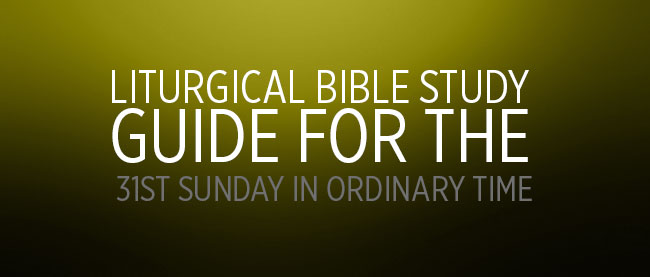1st Reading – Wisdom 11:22-12:1
The Book of Wisdom, or Wisdom of Solomon as it is called in some translations of the Bible, is believed to have been written in Greek, in Alexandria, around 50 B.C.. Although the book itself claims that it was written by Solomon, it was in fact written some 870 years later with the author, in order to highlight the importance of the work, using the prestige of Solomon, the greatest of the wise men of Israel. This attribution to another is called “pseudonimity” and was also used in the book of Ecclesiastes.
The author abominates any kind of polytheism and is proud to belong to a “holy and blameless race.” The first part of the book (chapters 1 – 5) is prophetic in style and somewhat Hebraic in the concepts it uses. It exhorts people to practice righteousness and sincerely seek God. The second part (chapters 6 – 9) concentrates on the source of wisdom and the need to obtain wisdom. The third part (chapters 10 – 19), from which our reading today comes, speaks of the magnificence of wisdom as demonstrated by the history of the chosen people. Today we hear that God spares men because He loves them.
2nd Reading – 2 Thessalonians 1:11-2:2
Today we begin our study of Paul’s second letter to the Thessalonians.
Accompanied by Silas, St. Paul arrived at Thessalonica in the course of his second apostolic journey (A.D. 49-52) after leaving Philippi around the summer of the year 50.
Thessalonica, now known as Salonica, is situated on the Aegean Sea and was a flourishing center of trade in St. Paul’s time. Founded in 315 B.C. by Cassander, who named it after his wife, a sister of Alexander the Great, the city came under the Romans in 186 B.C.. As far as religion was concerned it was a typical pagan city. Archaeology has unearthed the remains of many statues of gods and priestesses which give an idea of the religious practices of the Thessalonians. Inscriptions discovered indicate that they were very ignorant of religious truth and had no clear view of the survival of the soul after death.
There were quite a number of Jews living in Thessalonica. In keeping with his custom, St. Paul went first to the synagogue to proclaim the good news: Jesus was the messiah, the Old Testament prophecies had come true in Him, He had redeemed mankind by His passion and resurrection. We know that he preached in the synagogue on three successive Sabbaths (Acts 17:2) but he may have stayed there for as long as two months, lodging in the house of Jason. As a result of his preaching many Jews and Gentiles came to believe, including “not a few of the leading women” (Acts 17:4). His success earned him the envy of certain Jews, who organized demonstrations and attacked Jason’s house, looking for Paul and Silas. Not finding them, they brought Jason before the city authorities and he had to go bail for the two apostles (Acts 17:5-9). This led to St. Paul and his companions leaving the city in a hurry the same night – going first to Beroea (Acts 17:10) and later to Athens (Acts 17:15).
Paul’s unexpected departure from Thessalonica meant that the instruction of the recent converts was cut short; also their situation became difficult due to persecution by the Jews. This led the apostle to send Timothy to confirm them in the faith (1 Thessalonians 3:1-2) and bring back news of them.
Timothy caught up with Paul in Corinth and gave him a good report of the Thessalonians: they were persevering in faith and charity, despite still being harassed. Timothy also reported that certain questions were troubling the Thessalonians – things to do with life after death, and the second coming.
The apostle wrote the first letter, which he sent via Timothy, to complete his interrupted preaching and teaching. It had the effect of reassuring the Thessalonians about the fate of those who had already died in the Lord. However, some did not understand him correctly; some so misunderstood him in fact that they began to give up working (2 Thessalonians 3:11). When Paul heard of this he wrote the second letter to clear up the misunderstanding.
Gospel – Luke 19:1-10
As Jesus draws closer to Jerusalem and His passion, He continues to outrage the Pharisees by associating with people whom the Pharisees consider less than worthy – the poor, the afflicted, the sinners. Since to the Pharisees a man is known by the company he keeps, Jesus surely cannot be from God because His associates don’t keep all the ritual commandments. Today we hear the story of Zacchaeus the Publican.


